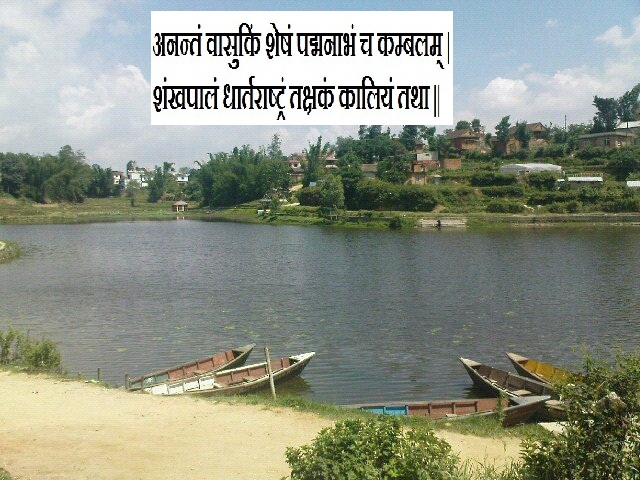अनन्तं वासुकिं शेषं पद्मनाभं च कम्बलम् |
शंखपालं धार्तराष्ट्रं तक्षकं कालियं तथा ||
share on
People gathered at Tau daha and Nag daha and other daha for celebrating Nag Panchami. Nag daha is considered as a resident of serpant king Karkatok. In same occasion people pasted pictures of snakes on the entrance of their houses. It is believed that doing so snakes will not cause troubles biting people.
People at Tau daha to mark Nag Panchami
Devotees paying homage to serpent king at Nag daha

Pasting portraits of snakes and worshiping at entrance of home.
Nag Panchami, a festival of snakes, is the day when nag is worshiped. Nag is snake and Panchami means the fifth day after no-moon day. Nags are worshiped on the fifth day following no-moon day on the Hindu month of Shrawan. The day is called Nag Panchami.
Nags are deity snakes. In Hindu culture, they own a prominent space. Kadroo, one of the wives of Kashyap Rishi, Lord Brahma’s son, gave birth to Nags. They were the rulers of Patal Lok.
On Nag Panchami, the great nine nags, namely, Ananta, Vāsuki, Padmanābha, Kambala, Shankhapāla, Dhārtarāshtra, Takshaka, and Kaliya were worshipped. These Nags were very powerful.
Legends:
There are various mythological beliefs about Nag Panchami and its celebration.
The universally held Hindu belief is that Lord Krishna conquered Nag Kaliya and put an end to his evil deeds on the day of Shrawan Panchami, as stated in Mahabharat. Therefore, people started celebrating the day as Nag Panchami.
Another myth states that on this day, while tilling his land, a farmer accidentally killed some young serpents. The mother of these serpents took revenge by biting and killing the farmer and his family, except one daughter, who happened to be praying to the Nags. This act of devotion resulted in the revival of the farmer and the rest of his family. Since then, Nag Panchami has been celebrated. It is believed that in reward for worship, snakes will never bite any member of the family. So on the day of Nag Panchami, tilling of land is forbidden
In the Kathmandu Valley, however, there
is another legend associated with this occasion. Once upon a time, the
valley was a vast lake full of snakes. It was called Nagdaha (Nag: snake
deity, daha: lake). Later, there came a time when humans thought of
settling down here and so they started to drain the lake (an antithesis
to another myth which says that it was miraculously drained by the
Buddhist sage Manjushree). The furious Nags who had power over the
rains, brought about a severe drought by preventing rainfall in the
valley. Luckily, a king’s tantric powers compelled the Nags to allow
rain to fall again. However, in recognition of their awesome power, the
king designated the 5th day of Shrawan as Nag
Panchami to pay homage to the Nags. He also ordered the preservation of
certain lakes as safe refuge for the Nags. The lakes so chosen were Taudaha in Kathmandu and Nagdaha in Lalitpur Dhapakhel.
Nag Panchami in Nepal:
On this day, Nepalese traditionally post pictures of Nags high above their doorway of their homes to keep off evil spirits. There is a tradition where Chitrakar caste of icommunity makes paper prints of the Nags and sell them to the people for five days before Nag Panchami. People worship the nag by offering a symbol of milk (the white color liquid from the paste of rice). They also keep milk for snakes near snake holes.
People make cottons garland, use cow dung and rice flour’s serpent’s form and worship it with cow’s milk, lava, barley, sesame, nuts and with some other religious items. As per the belief, the Snake Kings are offered food items such as milk and honey by placing them in gardens. It is believed that these offerings are honoured by the snake kings by giving good rains and crops, thus the prosperity. Scripture explains that without Nags’ help there will be no rain. It is also believed that if Nag Panchami is observed properly every year the Nags provide us good health, wealth and blessing during our life. If Nags are angry, they make us sick and no medicine can heal.
The Nepalese people believed that the snake kings had relation with the almighty God and would take care of them. The festival is celebrated in the month of July/August.










